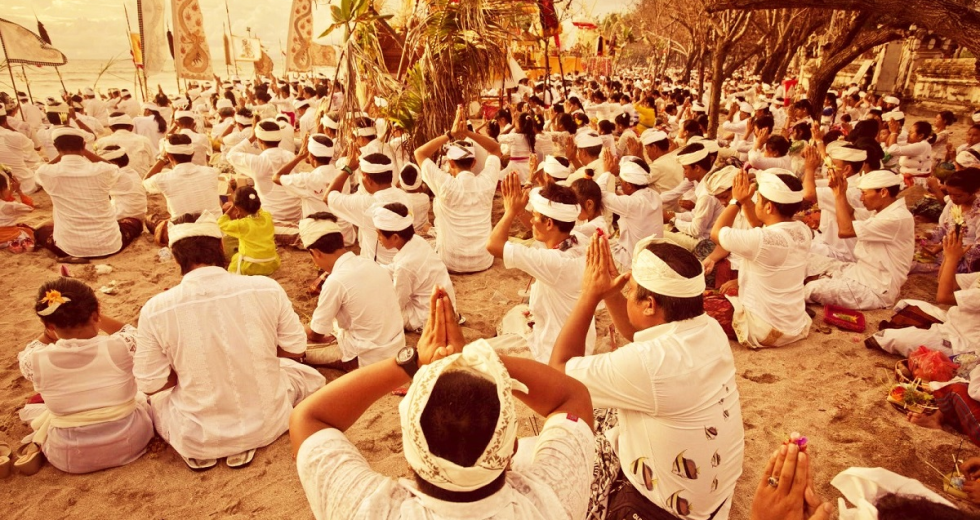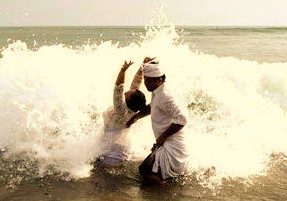BALI ON HINDU NEW YEAR: SOUNDS OF SEA AND SILENCE
“If you desire to live in peace, hear all that falls on your ears, see all that appears before your eyes, realize that everything is in accordance with the eternal law of nature, and be silent” – Swami Nirmalananda of Karnataka, India, who did took a vow of silence for 11 years
JAKARTA, BALI
INDONESIA
Indonesia’s religious identity is cloaked in paradox. When the nation organized an International Ramayan festival and invited all Asian countries to send their Ramayana dance troupes, many Buddhist and Muslim countries sent performers while the Indian Government’s first Prime Minister Jawaharlal Nehru refused to send any troupe saying that India is a secular country. Similarly, when Pakistani military dictator, General Zia Al Haq was invited to preside over the graduation of Indonesian military trainees, he became annoyed when the officers paraded and took their oaths of allegiance in front of a tall statue of the Hindu Monkey-God, Hanuman, complaining to Indonesian army brass, who calmly replied that in Indonesia, though they had changed religion, they retained the culture of their forefathers – a culture of which they are proud.
It is a position that leaders in the oft polarized Indian Subcontinent have difficulty understanding. But that doesn’t bother the sea of Hindu worshippers and non-Hindu revelers from mixing like salt with water to herald in the new year in the Indian Ocean. The three day festival beginning with Melasti, culminates with a day of silence on the Nyepi, falling on March 31, 2014.
Observers of Nyebi fast and meditate in order to welcome the new year. All daily activities stop throughout this sacred day. The purpose of this ritual is to fool evil spirits into believing that the island is uninhabited. In fact, all life stops, including transportation. It is for this reason that the Indonesian Tourism Ministry warns tourists not to make travel plans on Nyepi, one of an increasingly dwindling list of such reasons that don’t have to do with security concerns in a region that has seen its share of terrorist attacks.
This was not the case just over a decade ago when, in sharp contrast to the tranquility of Nyepi, amidst the bouncing tourists moving to the beats of a booming bass, at an overcrowded night club in South Bali, came a series of explosions, beats of a different kind that would end their revelry. The October 2002 bomb blasts, which killed 202 people, most of them tourists from Western Countries and Australia was watershed in the history of Indonesia. It was a sign that radical Islam had infiltrated the country, that the “Clash of Civilizations”, which was raging on in other parts of the world had assaulted this land of peace and tranquility. But unlike the volcanic blasts, which had caused mayhem in the past, this was not a natural calamity, fashioned from the hatred of man, it flew in the face of this largely tolerant country.
The scar tissue left by the attack has left Balinese Hindus more resilient. This year was no exception as they marched, proudly, to the beaches, major rivers, lakes and Holy springs on Friday to perform Melasti, a ritual to cleanse temple paraphernalia and to recharge the supernatural power of the temple’s sacred objects, in preparation for Nyepi, the Hindu Day of Silence, which will fall on March 31.
“We start as early in the morning as possible because the island has been experiencing very hot weather in the last few days and we don’t want to carry out the ritual in unbearable heat,” a devotee said.
Melasti was organized by the Desa Pakraman (customary village), which manages the Kahyangan Tiga (three primary temples), comprising Desa Temple (the abode of Lord Brahma the Creator), Puseh Temple (the abode of Lord Vwisnu the Sustainer) and Dalem Temple (the abode of Lord Sivwa the Destroyer).
Melasti was once performed exclusively on foot but vehicles of all kinds were used, this year to help shuttle even the infirm to the water.
“Siyut Beach, our Melasti site, is actually less than 3 kilometers from our village. I remember Melasti as a fun parade and an opportunity to walk with our extended family. My grandmother always pampered me with candies and shaved ice to encourage me to keep walking,” a Tulikup resident, Kadek Soma, reminisced, adding that nowadays, Melasti is a far quicker affair.
Dressed in mostly white and yellow traditional attire, customary village members escorted the temple paraphernalia — colorful parasols and ceremonial weapons — as well as Pratima (sacred effigies made of rare woods and precious gems) and object of worship, such as the lion-like barong and the terrifying-looking Rangda masks, onto the shore.
All these sacred objects were neatly arranged facing the ocean and surrounded by their devotees sitting on the sand. Temple priests and community leaders then presented the offering to Baruna, Lord of the Ocean.
Balinese Hindus believe that the ocean’s water has powerful, supernatural healing and protective properties. Ocean water can be used to neutralize negative energy while sand can be used to fortify houses from black magic attacks.
In Denpasar, Melasti was carried out at Padang Galak, Matahari Terbit, Sanur and Mertasari beaches while in Badung the devotees crowded Seseh, Kuta and Jimbaran beaches. Customary villages have until Saturday to perform Melasti.
Melasti is the opening ritual for the celebration of the Saka New Year, locally known as Nyepi or the Day of Silence an anticlimactic conclusion to the sound and fury aimed at warding off evil spirits..
From dance to sacrifice: festivities transitioned, today into a Tawur sacrificial ritual to appease the forces of nature, more feared in these tumultuous seas than terrorists, and restore the balance of the universe.
Later in the evening, youth will descend onto the streets with burning torches and percussion instruments in their hands to for the ngerupuk parade to banish the persistent demons out of the universe.

Ogoh-ogoh giant effigies are featured during the parade, culminating in their being set ablaze when the parade ends at midnight.
Meanwhile, public services will be closed during the Nyepi celebration. Ngurah Rai International Airport authorities, for instance, have stated that 400 flights would be canceled on March 31.
The temporary closure will last for 24 hours, starting at 6 a.m. on March 31, with 248 domestic flights and 152 international flights canceled during that period.For many, the festival is a Balinese tradition but not so for Rai Suparta, 56, who left Bali for Jakarta in 1977 and has stayed in the capital ever since, said the city brought new meaning to the sacred day.
“Nyepi in Bali is conducted en masse, people often see it only as a ritual,” he said. “It is true that Bali is more conducive [in observing Nyepi], but based on my experience, people do not implement [the rituals] in full.”
During Nyepi, Hindus are to conduct Catur Brata (the four abstinences), which consist of Amati Geni (not lighting fires, which are interpreted as anger), Amati Karya (not working, to contemplate one’s behavior over the past year), Amati Lelungan (not traveling) and Amati Lelanguan (refraining from having fun). While our Calcuttan contacts in Bali are looking forward to participating in the day of quiet reflection, they were not optimistic about the ritual being adopted in Calcutta.
“Amader Deshey Cholbe Na.
Bali isn’t the only place in the Indonesian Archipelago to celebrate. As Bhatta Rai described told us, after moving from Bali to Jakarta for work, Hindus find it particularly challenging and rewarding at the same time to observe the silence amidst the tremendous hustle and bustle of the big city. He looks forward to carrying out the introspection each year, and prepares himself the same way every spring to contemplate events over the past year, while trying to make resolutions for things that could be improved in the next.
The father of two said the biggest challenge was the temptation that arose from within.
“Strong commitment is really needed to survive the temptation [to not perform the abstinences],” he said on the sidelines of preparation for a Melasti ceremony at Aditya Jaya Temple in East Jakarta.
Melasti is a ceremony to cleanse temples of negative energy, along with their sacred objects. In the process, seawater is usually used as it is considered the most sacred.
Hindus in Greater Jakarta usually hold the ceremony at Segara Temple in Cilincing, North Jakarta.
“The purpose of Nyepi is to find answers from our contemplations,” Rai said.
Agus Irawan, 21, who will observe his fourth Nyepi in Jakarta this year, still struggles to find his peace during the day.
He said the atmosphere of Nyepi in Bali felt more sacred than in Jakarta, because in Bali people celebrated it together. “It is also quieter in Bali,” he added.
Made Agus said he sometimes had difficulty concentrating on observing Nyepi if the environment around him was noisy, such as in his rented room in the city.
For him, the challenge was fasting among people who were not observing Nyepi.
“It’s the same situation when Muslims in Bali fast for a month, I guess,” he said with a smile.
For Nyepi, Hindus must also fast for 24 hours and some forbid themselves from speaking.
“The hardest thing is I cannot be with my family,” said Made Agus.
Anom Ardamana Wirotama, 27, said observing Nyepi in a minority gave him a new insight into the sacred day. He said he discovered more meaning to Nyepi and the noise motivated him to perform the abstinences more solemnly.
He said people who did not fast and the noisy environment did not matter, with the important thing being how he conducted the ritual.
“It’s quite a funny scene. My house is the only house in the dark, with all the lights off the whole day,” he said.
Anom said the bigger challenge came from the inner self, not the surrounding environment.
“People not fasting should not be the reason [to not fast]. Hindus should be tolerant because we share the world together with others,” he said.
Anom’s words seem ironic to many residents, who tout Bali as the last bastion of Hinduism, perhaps in the world. Bali is a Hindu Island, nearly 95% Hindu situated within the world’s largest Muslim population. For many, it is a struggle to keep the island Hindu as it has been attracting increasing numbers of outsiders in recent years, thanks to its booming tourism industry.
While Hollywood romanticized Bali in the recent movie “Eat Pray Love,” Indonesians, mostly Muslims from the islands of Java and Sumatra, have been gravitating here looking for jobs. The tension between local tradition and outside forces is perhaps at its most intense in Kuta, where Islamic extremists bombed a nightclub in 2002, killing 202 people, and bombed three restaurants in 2005, killing more than 20 people.
In reaction, officials in Bali have been reinforcing local customs, especially those of Nyepi. Three years ago, they began sealing off Bali from the rest of Indonesia for 24 hours after tour organizers were caught smuggling in tourists on the Day of Silence as part of “Nyepi packages.” At the same time, the authorities banned radio and television and, last year, extended the ban to all satellite transmissions.
“The lesson from the Bali bombings was to return to our traditions and not be too influenced by outsiders,” Wayan Sutama a fifty year old security guard said Sunday. He and another Pecalang, Nengah Renda, 51, spoke as they faced a memorial for the bombing victims on Kuta’s main commercial strip; behind them, a lingerie shop called 69Slam featured an image of a woman with a man on all fours attached to a dog leash.
Two days earlier, in one of the many local temples squeezed between shops in Kuta, the residents of a neighborhood called Pande Mas had been putting the final touches on their ogoh-ogohs, effigies 20 feet tall representing evil spirits that would be burned later. “After chasing away the evil spirits, we have Nyepi to purify our minds, to reflect on what we did in the past year and to engage in introspection,” said Made Mastra, 52, the neighborhood chief. “Then we will be clean to enter the new year.”
Neighborhood boys, who can often be seen rubbing shoulders on Kuta’s streets with Australian, Asian and European tourists, were required to make their own ogoh-ogohs. On Saturday, a group of boys, led by Wayan Putra Setiaman, 14, said they would obediently stay home, not daring to step outside lest they be caught by the Pecalang.
They would not be allowed to use their television sets.
“But we can send SMSs to our friends as long as we’re quiet?” he said, zeroing in on a subject under debate among the pecalang.
How about video games?
“Yes,” he said.
“No!” said another boy, Wayan Wima Putra, 10, said, tapping the older boy across the chest.
“No,” the older boy corrected himself, explaining that videogames connected to television sets were forbidden but that portable ones were O.K.
It resembled the kind of conversation that diaspora children might have, and resonated with our correspondent tourists.
Even as Bali has reinforced its traditions, some outsiders said it had lost a bit of its legendary openness. Ucok, 41, the manager of a tattoo shop who moved to Bali from Sumatra 15 years ago, said he and other Muslims felt a little less like part of the Island.
“Since the bombing, the locals are more suspicious toward Muslims,” Ucok said, adding that outsiders would nonetheless keep coming here. “Bali is like sugar. Ants come to it.”
Made Darsana, 59, the deputy chief of one of Kuta’s three subdistricts, said outsiders were occupying an increasingly larger share of the population.
On Saturday, Mr. Darsana and a dozen pecalang were taking a break from their patrol at a temple where they quietly shared fried rice. Mr. Darsana, who spoke English with an unmistakably American accent, said he learned English about 40 years ago from an American Indian named Joe. Joe was among the hippies who discovered Bali, back when Kuta had perhaps a single guesthouse, Mr. Darsana said. “Life isn’t about material things, about tall buildings,” he said. “It’s about being one with the world. That’s the core teaching of Hinduism. I didn’t know this when I was younger. You learn these things as you live. Been there, done that.”
With development and the influx of outsiders, Bali’s environment has been irreparably damaged, he said. Outsiders now owned almost all the major businesses in Kuta.
“It’s sad,” Mr. Darsana said. “We now have only our culture.”
No doubt, Mr. Darsana like many Bali Hindus will have much to reflect upon, today, as Bali tunes “tunes in and drops out,” to use Hippee-speak, or more elegantly put, simply lets the sea dominate all sound.
 The Global Calcuttan Magazine
The Global Calcuttan Magazine 
